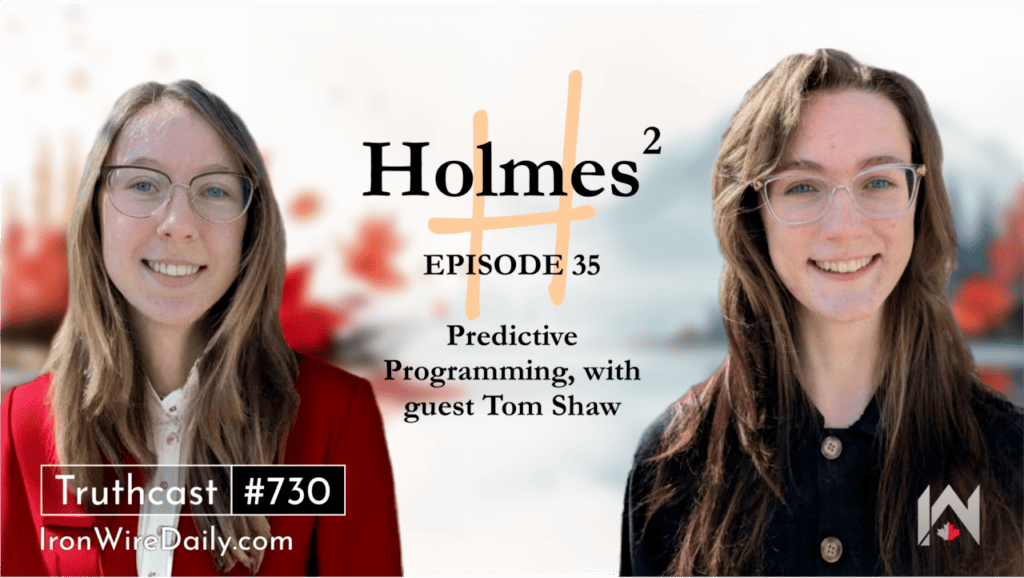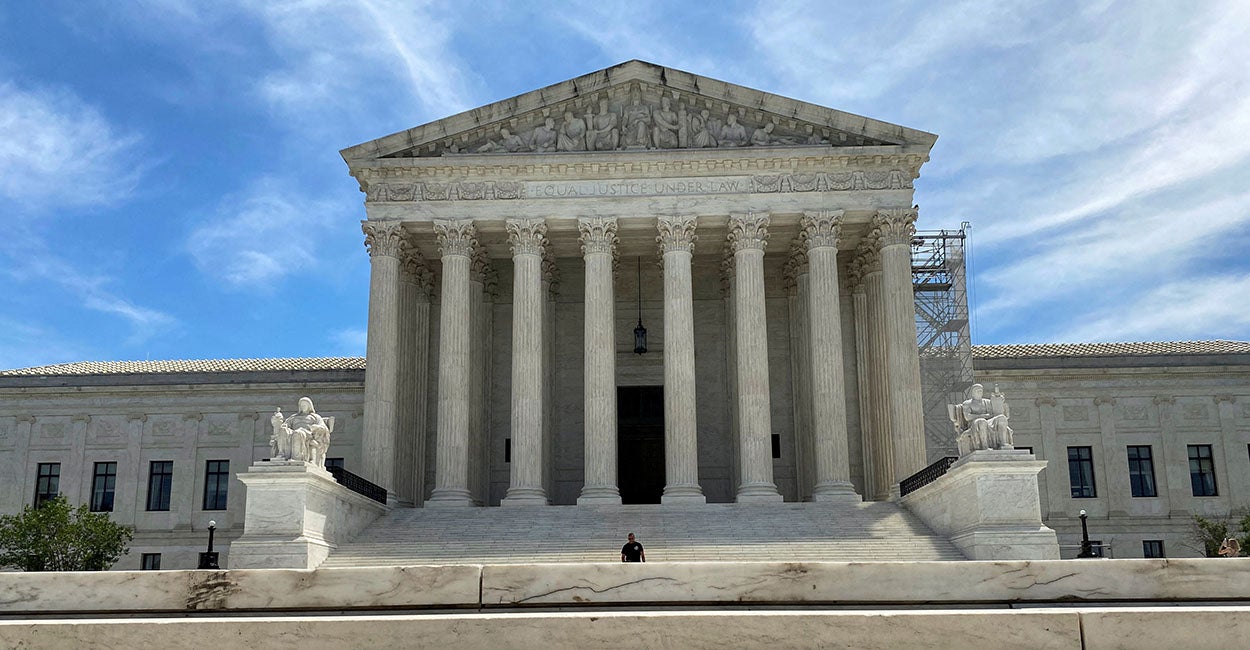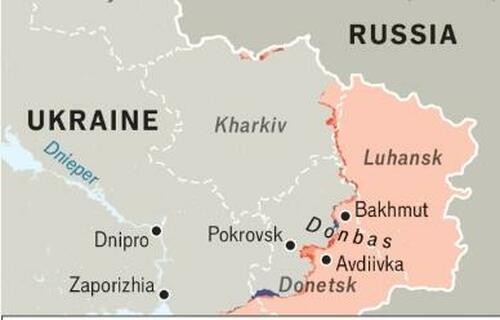Episode 16: Iran, ‘Limited Hangouts’, and The Gradual Revealment of Truth
Madison and Maycee Holmes
Want more Holmes?
Find them on Substack, Rumble and Youtube
You can also contact the Holmes sisters directly at Connect@at-home-with-holmes.com
(0:00 - 0:12) Alrighty, hi everybody, I'm Madison Holmes. They're gonna say, are you ready? I can't hear you. And I'm Macy Holmes. (0:12 - 0:21) And you're watching Holmes Squared. I know we didn't sync that, but. That's fine, everybody had a good laugh. (0:22 - 0:28) Well, we did just now. That face, if you guys didn't see it, it was just like lies. Yeah, total projection. (0:29 - 0:48) Everybody, that was my left hemisphere. Yes, oh my god. Okay, so today we are kind of gonna do a bit of an address again on some of the developments happening with the Iran-Israel slash U.S. now conflict. (0:49 - 1:10) I know that we touched last time that the ceasefire was getting introduced. Um, this time it's interesting because Tucker Carlson actually had an interview with the Iranian president of, oh yeah, I said Iranian president, I was gonna say president of Iran. And then, so there it is, Maddie put it on the screen. (1:11 - 1:26) It's Tucker Carlson interviews president of Iran. Um, me and Maddie just actually recently watched that and we thought it'd be worth kind of talking about today because. And it's much shorter than the one with Putin, unfortunately. (1:26 - 2:03) I liked the long form. Yes, well, actually, so this is funny. So first I want to say, I think it's hugely important that, um, not just necessarily Tucker, cause I'm not, I'm like reluctant to trust Tucker Carlson, but I think it's important that the interviews with these high official figures like Putin, like the president of Iran, I think they're hugely important because then you get to get introduced to what these leaders want, um, I guess, um, Western audiences to explore. (2:03 - 2:58) And like, some of it could be bullshit, but also some of it could be what they feel is important context for us to understand. Because what's also interesting is empires, or I guess just like, uh, countries like Russia, like Iran that have been around for a long time, they have a lot of historical context that the West does not have. We just did our interview with Matthew Aratt and it kind of showed just how young Canada is in the full context of things and just how much we're already screwing ourselves over and how we already described that it was built on purpose to be screwed over and fragment, right? But how is it that these people are, these countries have been able to stand on their own two feet for such a long time? Oh, actually maybe not stand always on their own two feet, but exist for a long time. (2:58 - 3:33) And do they have a national identity and a national pride and, and what is that and how is it related to how they operate? Because, uh, in the interview, the Iranian president was very much attributing almost like the state and their religion together to kind of show the context of how like they've, like he himself and believes in like, uh, their, their God and you know, like what that means to them in terms of how they want to operate on a state level. Right. And that doesn't mean that the U.S. didn't at a time have that. (3:33 - 3:43) I would say that it's been very, very augmented in terms of our leaders. If they, if they say that they believe in God, I don't know if I would believe them to be completely honest with you. Yeah. (3:43 - 4:09) Which, which version of God that's where Matthew's and Cynthia's work on, uh, Gnosticism and the mystic cult really comes in because, and this is, we had an event with them recently and Matthew had alluded to Jesus and Mary Magdalene, but that's not the same story as what the Bible usually tells. There's also the Gnostic version, which is. Yeah. (4:09 - 4:32) Like the Straussian version, like Leo Strauss, where it's just like, here's the interpretation of how you're actually supposed to read the Bible. And God's basically like an, an antichrist and like this like demonic figure and freaking like, that's like, like, this isn't it. Like this is how you actually had sex and then produce the Merovingian bloodline or whatever. (4:32 - 4:41) Yeah. And how you actually are supposed to read it is this, like what he actually meant was Yeah. So that's like the exo and esoteric version of. (4:41 - 4:45) Yeah. I think exo is what's in front of the public. Yeah. (4:45 - 4:54) And so is what's hidden for yourself for the hidden esoteric knowledge or exo. I think you're right. I think exo and then esoteric is. (4:55 - 5:01) And if we're not, we're not really spreading this information. Well, you just Google it for yourself. Come on. (5:01 - 5:16) Yeah, exactly. You can't do all the heavy lifting. And that actually, that's a good connection to, to what we're talking about today too, with the whole limited hangout, because that's kind of what that is. (5:16 - 5:49) This esoteric, you know, and the plausible deniability you for the sake of plausible deniability, you produce a limited hangout where you can produce this small part of truth, but keep the rest hidden. So that's kind of the same. I never really connected the, the way they did that in actual religions to the exo and esoteric knowledge, but that literally is also relating to how the CIA military operations and how all of them operate. (5:49 - 5:54) And then they give us our movies to normalize things. Yeah. Yeah. (5:54 - 6:24) So I found this thing on, uh, AI, cause I was just searching up like, what is limited hangout and what are some examples in real life? And the reason why I think we wanted to touch on limited hangout is because Tucker Carlson, when we were watching this interview, it's like, I think the Iranian president did a good job trying to represent himself. I think Putin, when he did the interview with Tucker did a fantastic job trying to represent himself in Russia and also provide context. It's like, he totally, he totally like sidestepped Tucker. (6:24 - 6:34) I was like, let me, let me give you a shit ton of context that most Westerners can't even hold in their brains for two seconds. Cause they have the memories of goldfish. Like I'm not even joking. (6:34 - 6:49) And it was brilliant. It was so well done in terms of like, here's what you don't understand about how we are and how we operate and what we know and what we're keeping in context in our mind. Like even for Putin to be able to relay all that history, I'm like, I'm sorry, but like. (6:50 - 6:54) Well, even in the Iran. Russians build different. Yeah. (6:54 - 7:21) And one thing that I, that I, I took for granted because here in the West, everything is so secular. When the Iranian president said, look, we don't want nuclear weapons cause it's not even by our religion standard and by God's law, it's not moral. It's not even something that we are supposed to pursue. (7:21 - 7:32) So we don't want nuclear weapons. And I never, I forgot about that aspect of their culture because. We don't really apply it necessarily. (7:32 - 7:38) We don't, we don't really use religion in the same way anymore. So I was like, oh, right. Okay. (7:38 - 7:45) That's interesting. That was another thing about their culture that I was like, that's interesting to hear from the horse's mouth. Well, yeah. (7:45 - 8:01) And also his reference to international law in the interview, I was like, oh yeah, like we don't do that either because we keep breaking it. Seriously. Like, cause they have the right to, if they wanted to, to develop nuclear weapons, there's nothing against them being able to do the thing. (8:01 - 8:08) But of course they signed the, uh, the, what is it? The non proliferation treaty agreement. Yeah. Yeah. (8:08 - 8:09) NPT. You're right. Yeah. (8:09 - 8:36) So it's like they're behaving themselves for the time being. And, but, okay, we'll get into that, but, so the whole point was, uh, like when you listen to it, what the Iranian president did a good job of was answering some of the questions. There might've been some things where you feel like it's a bit of a politician kind of sidestepping a bit, but I mean, they are politicians. (8:36 - 8:59) So, um, but why is Tucker Carlson giving people this? Why is he giving them the ability to listen to something like this in order for them to, I guess, quote, gain their own information and garner as much as they can. It's clearly out of the goodness of his heart. I don't know, but it's a good question. (8:59 - 9:09) Cause it's not the first one he did like this. So this is the one with the Iranian president, but recently he did one with Ted Cruz. Um, giving him a run for his money. (9:09 - 9:27) And I just, for everybody. And he also did one with Steve Bannon and you and I have a lot to say regarding Steve Bannon. So it's even just the fact that there's Steve Bannon, Ted Cruz, Iranian president, all kind of within this same timeframe-ish limited hangout. (9:28 - 9:54) You got to ask yourself, why now? Always, why now? Why are they showing me this now? Why is it okay for me to look into it? Well, yeah. And, um, before I even read the limited hangout thing, what I think I'll do is I'll just say me and Maddie were watching or listening to, um, an episode on breaking history. And what we found was that the, the idea of regime change is something that's circulating. (9:54 - 10:16) That's some of the, like, that's what Ted Cruz was referring to. But then Gordon and Matthew were talking about, um, regime change in this breaking history episode. And what they came to, uh, I guess, hypothesize was that, um, I think it was, Maddie, 1953. (10:17 - 10:39) And in 1953 there, so there was this guy, Matthew in that- The Shah, the son of the Shah. They play a video of him in this breaking history episode of the son of the Shah, um, basically saying like, Iran, we need to rise up against, um, uh, probably Israel, honestly. No, the Iranian government. (10:39 - 10:45) Oh, the Iranian government. He's calling for a revolution or another word for that. Who? Yeah. (10:47 - 10:56) And he's talking about how we need to overthrow the Iranian regime. And then he's the son of the Shah. And Gordon was giving context of who the Shah was. (10:56 - 11:11) And he was saying that, uh, there was this guy named, um, Magadish, maybe, um, who was trying to nationalize Iranian oil. He did. He did before the Shah got in. (11:11 - 11:18) And then he did nationalize it. And then the Shah, I don't know what platform he ran on. I'm not sure. (11:18 - 11:28) He just, I know he got in. And when he got in- The help, I believe, of our intelligence agencies is what, um- Gordon. Yeah. (11:28 - 11:33) Yeah. Under, cause Eisenhower helped with that at the time. I believe he greenlit that. (11:33 - 11:40) That was the US president at the time, is what Gordon said. Oh, like greenlit, like a color. Oh, yeah. (11:40 - 11:58) Yeah. So when, um, Magadish, I think Magadish, when Magadish nationalized, um, the oil, you're right. Gordon said that the CIA and MI6, they greenlit a color revolution coup to, um, overthrow this individual. (11:58 - 12:16) And then they put in the Shah. And then the Shah signed a 25-year agreement called the Consortium Agreement in 1953. And that was basically to give, um, now this oil that's nationalized, give it back to the British because the British Empire had it back in 1914. (12:16 - 12:36) Give it back to them to have for access to the oil for themselves. And then once the 25 years came up, the Shah was like, I'm not gonna sign on to this again. Like, I'm not gonna renew this deal because he realized that it was like, you guys are not using this to actually help us in any way. (12:36 - 12:42) You're just basically, um- Destabilizing. Destabilizing us. The whole Middle East. (12:42 - 12:47) The whole Middle East. And just using it as, like, for yourself. Um, so he was like, no. (12:47 - 13:15) And then that in, uh, episode, Gordon says that his theory is that that's what led to the Iran revolution in 1979. Yeah, which led to the Islamic Republic, which sounds like a good thing. But what we know also with the, um, even how India's revolution towards, um, the same Republic ideal came was also via that same thing. (13:15 - 13:30) These external forces went, oh, we don't really work. It was another limited hangout because they were realizing there were some, of course, natural independence movements coming up in India. And they went, okay, we need to put figures in there that we have a hand on. (13:30 - 13:38) That way we can control the outcome. And this was similar. So that's what happened with this history in Iran. (13:38 - 14:00) And the one thing, listening to even this nationalizing, because the first time I heard of the, heard the term nationalizing was actually in G. Edward Griffin's book. And he talked about nationalizing the railways and stuff like that. And even Matthew Errett talked about the nationalized our railway to, um, give us something to rally around as Canadians. (14:01 - 14:41) And the, so nationalizing sounded like a negative to me because it was just this false pretense to unite the people. However, understanding, um, the stealing and manipulation and the subversion of natural resources that in the Anglo American empires have been doing for generations, uh, to any country that can basically, um, nationalize Burkina Faso tried to do the same thing. I think they wanted to, I think it was trying to nationalize the gold because that was the resources they had. (14:42 - 15:04) And in this example with Iran, they were nationalizing the oil nationalizing as in putting it back in their own hands. So it wasn't in the hands of the British and Burkina Faso wanted to do the same thing, which is in Africa. And, um, and then of course regime change because the Anglo American empire always wants to maintain the natural resources. (15:05 - 15:24) They want to be able to ones that handle it, um, refine it, whatever they need with it. So that's one thing people should also have in mind. Cause I had to keep that in mind when I first heard when he was talking about nationalizing, I'm like, oh, is that a bad thing? It's like, oh, depends on the mode of attention, I suppose. (15:25 - 15:48) Yeah. Like I was just so, uh, I know that this is going to not necessarily set a good example, but I do go to AI a lot, not because I'm retarded and can't think for myself because you have to just know how to ask the right questions in order to try and challenge the AI and be, I asked for the resources. So I actually say, give me your resources. (15:48 - 15:55) And then I click on the links myself and go read them. So that's what you should do. Um, so that we're not just taking its word for it. (15:56 - 16:33) Um, cause anytime it's like page not found, it's either cause some figure took it away cause maybe it's legit or you're just like, hmm, like, can you please try and find me this thing? Like, why are you giving me a link that is not working? What the heck? But, um, I was just looking it up here and it says to nationalize a resource means that government takes control and ownership of a natural resource industry or company from private entities and brings it under state control. This typically involves government ownership. Uh, the state assumes full or majority ownership of the resource oil, minerals, water related industries, uh, control over production and profits. (16:33 - 16:54) The government manages extraction, production, pricing, and distribution, often redirecting profits to public funds. Um, just more and more, uh, description in this. And then it was like using some examples of, uh, Saudi Amarko, Saudi Arabia, gradually to control of its oil from foreign firms. (16:54 - 17:21) Um, so again, like, um, when you're nationalizing, it means you could be keeping the profits within the country. Right. And also it's like, as Matthew was alluding to when you have it, um, it's not necessarily that I'm always like, like that I'm necessarily in favor of like government control because obviously if government's corrupt, then like, right, exactly. (17:21 - 17:43) Then, but at the same time, the next thing is, uh, well then it should be, you know, to the public or it should be like, you know, private. It's like, yeah, but if private's in bed with government, government's in bed with private, then who the hell, what the, what does it matter? You know what I mean? It's like, it's at the end of the day, it still comes down to, um, a moral society. Yes. (17:43 - 18:07) Like, yeah. So corrupt or not government, private or not, it still can be, um, it can still act as socialism, even if it doesn't say the system's socialist. It could be a socialist capitalist system, for example, but, um, us, um, but, um, so when we're talking about, sorry, that was like a little tangent. (18:07 - 18:42) You were talking about nationalism because you were talking about the, the Anglo-Americans like ability to try and grab in for itself because it was talking about even in that little AI thing about foreign entities, right? Yeah, just explaining the, the, cause we were on the breaking history episode to explain what they aren't telling us about, uh, the history of Iran and this, because Tucker Carlson was talking about, again, regime change with lovely, lovely Ted Cruz. I just, I want to warn everybody to watch this. I'm glad Macy didn't and bless her soul. (18:42 - 18:51) She got to listen to more productive things because I took on the terrible, I couldn't even get through it. I won't lie to everybody. I got to hear, I got halfway. (18:51 - 18:58) I was told not to waste my breath or at least not waste my time with it. I started like five minutes in it. I was like, oh no. (18:58 - 19:27) Yeah, because you want to talk about limited hangouts. Um, and this whole thing is now that a lot of the information has come up about this Iran-Israel, it was a warfare, a theater, you know, it was political theater. Um, that interview it's political theater, it's Tucker theater, but it's absolutely an absurd amount. (19:28 - 19:35) Dial it to a hundred, put it on steroids type theater. It is, it's not even good theater. It's one of those teen drama movies. (19:35 - 19:51) It's terrible. All Tucker does is gaslight and don't get me wrong, Ted Cruz, neocon, neocon hard. So according to this setup anyway, and this beautiful plot that Tucker did, Tucker looks like the reasonable moderate compared to a Ted Cruz. (19:52 - 20:26) Um, so, and it was just gaslighting and they were arguing the whole time, but the key takeaway is the regime change because Ted Cruz is saying how necessary the regime change in Tehran, which is the capital of Iran really is. So that's where this whole is the nuclear weapons. Is that really the point of this thing? Or is the regime changed the goal all along? And that's what Brian Burletic has been talking about, um, that the nuclear weapons was really just a, that was the diversion. (20:26 - 20:38) It was the excuse. Whereas regime changes the real long-term goal so they can get at, you know, places like Russia and stuff like that. Cause you know, destabilizing the BRICS nations is. (20:39 - 21:22) That's one of the biggest things that most people in particularly this audience are not going to be entirely privy to is that we have lots, all the info, all the sources, um, or I guess people that we allude to where it's like breaking history, Matt Aret, um, red pill diaries with, uh, Rashid, um, Alex Craner, Tom Luongo on the Sean Newman. Sean Newman has them all the time. Um, uh, Brian Burletic, like Cynthia Chung, all these people, they, um, and various others like Danny Haifong, like there's so many other, um, I guess analysts, they are painting a much larger picture of what they actually think that the enemy really is. (21:23 - 21:36) And it's, it is almost like neo-colonialism essentially is what I would say is a huge part. Not like now that branches into why, like why that is right. And you should definitely want to branch out into that. (21:36 - 21:59) But the, that is a huge problem that we still do face today is unfortunately, what are some of the old tactics of conquering that just got basically smeared under a nice veneer of democracy or diplomacy. And, but it's really just a new version of the same thing. Um, so now with that being said, I should, I can read now the limited hangout thing. (21:59 - 22:06) Cause that was what, um, we wanted to touch on if I can pull it up here. Just give me a minute. Okay. (22:06 - 22:12) So are you good? If I read it, Matt? Yes. And make it nice and interesting for all our listeners. Oh, okay. (22:13 - 22:23) I am not, um, Shakespeare guys. I'm very, I'm like Cynthia Chung. We are the most monotone women when it comes to reading things. (22:23 - 22:30) I'm the most monotone person. Um, well now's the time, but now's the time to practice. So I got this from AI. (22:31 - 22:49) Um, let me just start starting like a basic white bench. Just like, so I got this like from my AI source and okay. So a limited hangout is a term originating from intelligence and public relations jargon referring to public relations. (22:49 - 22:57) Who's the king of that? Edward Bernays who wrote propaganda. Oh, he's like the nephew of Sigmund Freud. Right. (22:57 - 23:07) I remembered that. Yeah. And isn't his grandson or something that's like, I'm going to sort of commit to the bit, the fucking, um, owner of Netflix. (23:08 - 23:16) Um, yes. I think so. Like his family line traces to literally the owner of Netflix or the CEO or whatever. (23:17 - 23:40) Okay. So from intelligence and public relations, jargon referring to a strategy where a person or organization selectively reveals some information usually to appear transparent while withholding the most damaging or critical details. The goal is to control the narrative, deflect scrutiny, and prevent deeper investigation into more serious wrongdoing. (23:41 - 23:58) Key characteristics of limited hangout. One, partial disclosure, admitting to a minor or less damaging aspect of a scandal while concealing the bigger picture. Two, planned confession, offering a controlled release of information to preempt further leaks or exposure. (23:59 - 24:21) Three, misdirection, shifting focus away from the most incriminating facts by acknowledging only what is already known or suspected. Four, damage control, using the appearance of honesty to restore credibility while avoiding full accountability. And then real life examples of limited hanging out are corporate scandals. (24:21 - 24:44) A company caught in a major fraud might admit to accounting errors while hiding systemic corruption. Example, Volkswagen, uh, DeSalgates initially downplayed the emissions cheating as a technical issue before the full scale of the deception was exposed. Government and intelligence operations. (24:44 - 25:08) The CIA's MKUltra mind control experiments were partially declassified in the 1970s, but many documents were destroyed, leaving the full extent of the program obscured. The NSA's mass surveillance, revealed by Edward Snowden, was initially dismissed as limited to foreign targets, while evidence showed widespread domestic spying. Political figures. (25:08 - 25:27) A politician caught in a scandal may admit to a lesser offense to avoid deeper scrutiny. Example, Bill Clinton's Lewinsky scandal initially denied any relationship, then admitted to an inappropriate one while downplaying other allegations. And then media and public relations. (25:27 - 25:43) Celebrities or influencers caught in controversy may issue a vague apology. Mistakes were made without addressing specific allegations. Example, Lance Armstrong long denied doping before finally admitting, but only after overwhelming evidence forced his hand. (25:43 - 26:00) While limited hangout works, they exploit the public's tendency to accept partial truths when presented as honesty. They discourage further investigation by giving the illusion of full disclosure. They allow wrongdoers to shape the narrative before opponents or whistleblowers can reveal the whole story. (26:00 - 26:07) How to spot a limited hangout. The admission comes only after pressure or leaks. The confession is vague or lacks key details. (26:07 - 26:51) The focus shifts to moving forward rather than accountability. Investigators or journalists declare the matter resolved prematurely. Mistakes were made and then throughout the whole process, oh, you know, maybe masks don't work and then maybe the, maybe the, um, genetic bioweapons don't stop the spread, but they will help with symptoms. (26:51 - 27:11) You know, all of these little steps that they, that those were all, those admissions were really just limited hangouts because the truth was coming out, still coming out. And people need to keep looking at it because that stuff is still not over. We are still seeing the effects of that, which is why we put on events like the injection of truth and stuff. (27:12 - 27:34) But do you think that the, uh, that the whole, uh, nuclear debate then is limited hangout? Yes. And you know, it's because it's interesting because I was getting into, like we were getting into the, the, the debate because we were listening to Tom and Alex Cranor talk about, uh, their, their views. Right. (27:34 - 28:12) And I thought that, you know, it's, it's, it's not that it's not important to have the discussion. I think that Tom and Alex have more context about what we were just describing with the whole deep roots of the Anglo American empire in terms of, um, always having a hand behind these, um, sort of conflicts because even in the interview, I mean, I don't know anything in terms of this Iranian president, so I'm not sure whether or not he is or is not aware. But in the interview, he literally said, he's like, Tucker, your Western officials admitted that they created ISIS. (28:12 - 28:17) Right. Like, and they're in our neck of the woods type of thing. Right. (28:17 - 28:58) And then of course, Tucker tries and he comes out saying, well, it's like, well, what do you have to say about Iran, um, Iranian, like extreme nationalists, um, kind of saying like death to America or that they're waiting within America to strike on behalf of the government. And then, I mean, it could be plausible deniability when the president said, I've, that's the first I've heard of this. I mean, uh, not the part about, you know, the death to America, but I think he was so smart to say, like, his response was very eloquent in my personal opinion, because I think that it, it does reveal the, like, almost like one of the most important things that people do need to understand. (28:58 - 29:46) When they say death to America, they may not mean death to American people. They may not even mean death to America as a, as a system. I think that what, like, as what he said, he says, he thinks that when they say that it means death to the, um, American hegemony forever wars that have been perpetuated under the veneer of what we talked about in our last couple episodes about, like, color revolutions and coups, because it's like, that is probably what they're referring to when they said death to America as an end to this, um, hegemonic neocolonial way of operating in, in relation to your international neighbors. (29:46 - 30:29) That's definitely one possibility. And the other could be what if those, the people that, that leaked footage that came out, what if those people were, were working for one of the, um, any, like these NED democracy groups, you know, what if they were those like the BLM movements and the Antifa? What if they were funded by other people? So yeah, what if they give Iran a bad, right? What if they were just actors to stir the pot? Yeah. These are things, these are things to ask questions, but you brought up the nuclear thing and that being a part of the limited hangout and we talking about, you just read that very, very concise list about what limited hangouts were. (30:29 - 30:42) And one of the things that said it was partial disclosure. Partial disclosure is, reminds me of plausible deniability. And we just watched everybody we've watched last night, Independence Day. (30:44 - 31:01) It's a good movie. It's a, it's an amusing movie for sure. But in it, the president, you know, they reveal that there's been this whole department looking at Area 51 and it's been going on for years. (31:01 - 31:14) And the president walks in the department. He's like, why did I never know this? And it's literally the guy behind him says two words, plausible deniability, sir. And it's because, and that's very, it's very, very true. (31:14 - 31:42) So this whole partial disclosure, the reality of when that was like first introduced, it's another word is like compartmentalization. So partial disclosure talking about this nuclear game that's going on in warfare, the Manhattan project, people can watch. Matthew's series, The Hidden Hand Behind UFOs. (31:42 - 32:32) Yeah. In that he talks about the Manhattan project and that was basically the project that was created to create the, the atomic bomb. And in it, he, we met, he like literally, I think, quick Google searched it and said something about around like 130,000 employees that were initiated for that project and how he described how it actually operated was through compartmentalization where it's like you have all these different sects and nodes that are working to, that are working for trying to, well, they didn't necessarily know, higher powered ups knew that it was going to be for the atomic bomb and it was going to be for this much more nefarious, larger project. (32:32 - 33:00) But the individual sects, they were just doing their own little thing, maybe contributing what it is that they were contributing to the whole, but they might've not known that. Hence, that's the whole point of compartmentalization is keep kind of everybody confused while you yourself know what's going on. But if everybody else knew what's going on, then you have a lot of, um, I guess more voices trying to potentially add their input as to what they think about this. (33:00 - 33:12) And it's like, no, no, no, we don't want your input. You just go over there, be a happy little scientist, make your cute little discoveries. And then while you're at it, we're going to create something that's going to, you know, cause havoc. (33:13 - 33:18) Yeah. Money's the water. So everybody's confused and they don't know how to discern anything. (33:18 - 33:37) And that's, that's why we have to watch so many things that we do and all these people. And it's not like we agree when we bring up people like Brian Berletic and Tom Luongo, Rashid, Danny Haifong, all Tucker Carlson. We are, we try our best to discern everybody. (33:38 - 34:05) And there's, we, I genuinely believe that most people, there's a little bit of part truth in most of what they say, because that's also why they say lies work because there's part truth in it. So it's like, you, I keep this stuff in mind. Um, but this whole, even this compartmentalization topic where Brian Berletic, he really condemns, he talks about the United States. (34:05 - 34:20) He'll say America as the big bad, just America. But I wouldn't condemn the entirety of every, you know, 50 states. I wouldn't look at them as this big, bad, evil hole. (34:20 - 34:59) I'd specifically call out the intelligence agencies or some political figures, but I'd try and hone in on specific people, not to just, even when me and Macy talk about the British, we tried and specify City of London, or we'll do Anglo-American Empire, because just condemning all of Britain as if they hadn't, if there isn't good people in there and they don't have their own internal resistances, they've had their own civil wars in their history. So you listen to these people and you have to, you don't have to agree with everything they say. You don't even, you don't have to agree with everything we say. (34:59 - 35:10) Half the time these shows are really us just exploring in all honesty. We're trying to map, we're mapping with you. You know, we're trying to put more pieces, puzzle pieces together because there's a lot to take in. (35:11 - 35:22) Well, yeah. And also the tactic gets used on us in order to try and disseminate information. It's like they'll come out with stuff like Epstein files or they'll come out with what's going on right now in the current crisis. (35:22 - 35:51) And it's not that neither one is more important than the other because it's still like we should be paying attention to child trafficking and pedophilia and what that means and where it leads to. But when they bombard you with information or they take things away, hence the limited hangout, like it makes us start giving up and thinking that there isn't a way to understand or solve the problem. Like, oh, it's like, oh, you're never going to really figure it out. (35:51 - 36:22) So it's like, why bother? You know what I mean? But that's, I think that that would be a mistake to make even though it's a really, really understandable and I empathize with feeling that way at times. I feel like you have to still just keep trying to discern. And honestly, when when real life's playing out in front of you, that's a tale in the sense of like what's physically going on, not just what's being said, but what is physically happening. (36:23 - 36:39) So I think that that's still one of the most important things to pay attention to. Yeah. And then Mace, do you want to on like what's really happening in life? You alluded earlier to the non-proliferation treaty, and this is just more stuff in relation to this whole Iran thing. (36:39 - 36:59) Yeah. So for that, I recommend people go do check out the Sean Newman podcast with Alex Cranor and Tom Wongo because they do talk about the idea of Iran pursuing nuclear weapons, but they do it in a much larger context. Yes. (36:59 - 37:14) Like way larger than just a simple debate on this is not just about nuclear weapons. It's in context to what? What nasty entities? There are many. It's number 878 on the Sean Newman podcast. (37:15 - 37:56) And in it, they're talking about the fact that Alex Cranor brings up the fact that Iran apparently got information telling them that Israel is developing nuclear weapons. That they have their own nuclear weapons that they are developing. And what's interesting to me is I was kind of bringing this up to our dad, and I was like, hey, like, so Israel, who's screaming bloody Mary about nuclear weapons and proliferation and going like, oh, no, Iran can't do that. (37:56 - 38:19) But they themselves have it and are creating it. And there are sources that actually like statements and release documents that kind of go down a list of the worries back in the day about Israel's development of nuclear weapons. I, if I can. (38:20 - 38:30) You mean Iran's? No, Israel in the sense of just so it's evidence in the sense that they do have it. And there were people that were worried about the thing. Right. (38:31 - 38:55) OK, they themselves have not signed the nonproliferation treaty. And then they apparently decided to strike Iran in the in the podcast episode. Alex and Tom allude to the fact that I think in this theater warfare, Trump might have called him up and been like, hey, man, like, I can't keep you at bay much longer. (38:55 - 39:02) So you have this time frame. But otherwise he's probably going to strike. But who's reasoning? Right. (39:02 - 39:06) Be like, oh, Iran's nuclear program. No bueno. Right. (39:06 - 39:17) And it's funny because the minute that they think that Iran has nuclear weapons, they're like, we need to strike the minute Iran gets evidence. Israel has nuclear weapons. They they still don't strike. (39:18 - 39:36) Did they strike first? No. Right. And so why? Why are they doing that? And then also, if they themselves are not even under scrutiny of the what is it? The International Atomic IAEA, I forget the name of it. (39:37 - 39:47) It's basically something that keeps eye on atomic. International Atomic Energy Agency. Thank you. (39:47 - 39:51) Thank you. Yeah, exactly. So they're not even Israel's not under scrutiny of it. (39:51 - 39:56) They haven't signed the treaty. And yet they have nuclear weapons. And they're actually not. (39:56 - 40:12) They're they're saying that they're neutral in the sense of they're not disclosing any information. And yet you're getting mad at Iran for having nuclear or weapons or at the very least claiming that they do. And so, Maddie, you can bring up the chart now. (40:13 - 40:31) But this is just so funny because it's basically if you look at this. This is Nia Nia who Iran nuclear bomb claim timeline 1992 to present 1992 to present day, Benjamin Nia who has been screaming about Iran, the boy who cried, having nuclear capacity. Right. (40:32 - 40:39) So in 1992, Iran is three to five years from nuclear capability. Three to five years, guys. It is twenty twenty five. (40:39 - 40:57) And he's still saying if you go like Iran days away from enriching uranium for a bomb, it's like if you just go down the list, it's literally like Iran aggressively pushing nuclear weapons. Iran could produce a bomb within a year. I ran like I ran months away in 2012, months away. (40:57 - 41:05) We can plea enrichment by spring slash summer 2013. Closer than ever to nuclear weapons in twenty twenty one. Yeah. (41:06 - 41:22) And yeah. And so you have to understand that that's the propaganda meant for the plebs like that is totally meant for people. And because, again, we have the memory of Goldfish, we don't even see that it's like he's been saying this for years and still nothing showing up. (41:22 - 41:40) And even Alex Craner and even the Iranian president both had good points where they're like, we haven't invaded anybody in like two hundred years. Like we haven't like the Iranian president. Like, have you seen us do anything out of the ordinary? And it was actually dad that brought up this point. (41:40 - 41:55) And I thought it was an interesting one because I still haven't read the Bible yet. But he was like, it's actually in religious texts where they talk about like keeping your own house in order before you go out and try to order the world. Right. (41:55 - 42:11) And so, again, with Iran's religious affiliation, it's like they themselves could be just trying to get their house in order first before they decided to do anything like that. And as the Iranian president said, they don't have any intention of doing that. And it's funny because you could be like, oh, well, I don't know if that's true. (42:11 - 42:23) Well, Benjamin here saying that they're going to have them in 1992 and it's 2025. The evidence doesn't suggest that they're doing anything. Yeah. (42:23 - 42:33) And even then, if they are, it's like, what? They don't have the right to defend themselves. And like, don't get me wrong. I'm not like for nuclear proliferation because then everybody feels like, oh, well, I need one. (42:33 - 42:34) Right. Yeah. Moral of the story. (42:34 - 42:58) I thought the best when you go and listen to that interview, and I really do encourage people to do is when Tomolongo and Alex were having their debate, the best thing that they came to was, OK, enough of the abstract of, well, if an Iranian regime that was bad got in and had nuclear weapons, that'd be terrible. It's like, well, sure. But it's like the one that's in is trying to deal with the situation with Israel that's in, which has committed terrible atrocities. (42:59 - 43:15) Let's not forget what's happening in Palestine and Gaza. That aside, which it shouldn't be. It's like they're like, OK, how do we deal with that right now? And I thought the best conclusion that those two guys came up with was like, OK, if Iran agrees to say. (43:17 - 43:33) Fine, we'll put down our nuclear development if you do it, too. It's like if we get rid of it, you get rid of it or you get rid of it, then we get rid of it. It's like I felt like that to me just made the most sense in terms of trying to deal with the physical negotiation right now. (43:33 - 43:46) But again, even then, guys, it's like, is this just about nuclear proliferation? That's like that's the main big probably not. Yeah. This whole episode's been on the limited hangout. (43:46 - 44:24) And I think nuclear weapon, at least this theater has been. A little bit of and that could be because I know even Matthew being one of the co-hosts of the Moscow America University, you know, those roundtables that they have, America University of Moscow. They talk about the genuine threat of nuclear warfare, but also because of our knowledge of the Guzenko hoax and the Cold War utter nonsense. (44:25 - 44:55) Maybe it's us being young and naive and we're not really embodying the fear that could really lead nuclear war of nuclear warfare, because there is still the Samson protocol. There's the Samson protocol that Israel has. It's not official policy, but it's just an idea that has proliferated in the air that basically says that if Israel faces an existential threat, that it'll just straight up go. (44:57 - 45:03) Suicide bomb and bring everybody down with it. It's basically like if I go down, you're all going down with me. Yeah. (45:04 - 45:14) So it's like those are all possibilities. It's just I have and it could be because I'm young, but also knowing the information. I remember all of those. (45:14 - 45:32) We had to do all of those lockdown protocols and remember the actual ads and they recorded children's like, okay, students get under your desks. I remember that Cold War propaganda. Well, we don't because we weren't there. (45:32 - 45:47) I remember seeing it and I remember having to do it in different lockdown drills and some teachers told it the same. Wait, you actually had to go down underneath your desk? Yeah. They said, oh, it's like school shooter things. (45:47 - 45:54) And that's also another thing that they put into it. Yeah. I didn't, but if you lock down procedures. (45:54 - 46:07) Yeah. But it's just because of also that knowledge and looking at that or I'm like, I don't know if that's the goal. I think they again, rather than destroying. (46:08 - 46:22) They typically when you're, you know, you want to take over infrastructure, you don't want to destroy it. You don't want to. They want to all these Anglo American oligarchs, they want their hands in the pie. (46:22 - 46:43) But if you completely roast the pie, there's nothing to put your hands on. So this is just a stuff that I think about when people talk about this nuclear threat, especially. Well, yeah, like what excuse are they using just to basically put in their own guy? Yeah. (46:43 - 46:46) Like, yeah, team change thing. It's like, exactly. Yeah. (46:46 - 46:54) Like, so. Yes. So everybody go watch Independence Day. (46:56 - 47:05) Gosh, that was not the concluding sentence of this freaking. No. No, but you can. (47:06 - 47:18) No, you definitely can. No, the moral of the story is there's a lot of limited hangout stuff going on. We've been talking for 47 minutes. (47:18 - 47:41) And well, we have some more limited hangout stuff going on or even just stuff that's starting to leak out with even. RFK Junior and the health movement that's starting to look very sketchy, but we'll come back to that on another episode because it's worth talking in and of itself. Yeah. (47:41 - 47:45) So. Yeah. So thanks, guys, everybody for watching. (47:45 - 47:55) Hopefully it was educational for you. Hopefully you guys are able to apply it in your own understanding as well. And so, yeah, thank you very much. (47:55 - 48:00) And Manny, you ready? This has been Home Squared.
















